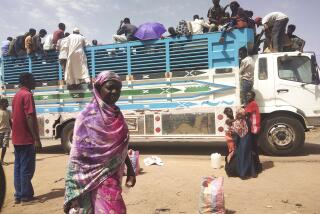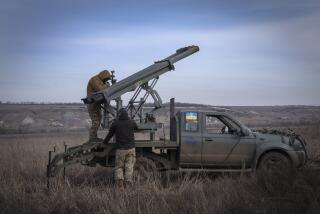Pentagon opens second mobile laboratory in fight against Ebola
Moving to help check the Ebola epidemic in West Africa, the Pentagon on Friday opened its second mobile laboratory in Liberia, the country hit hardest by the deadly disease.
Three weeks after President Obama announced that the Pentagon would help respond to the growing crisis, military officials insist they are making progress despite severe logistical difficulties in the impoverished region.
“We are supporting U.S. government and international relief efforts by leveraging our unique U.S. military capabilities,” Gen. Martin Dempsey, chairman of the Joint Chiefs of Staff, told reporters Friday. “Specifically, we’re establishing command and control nodes, logistics hubs, training for healthcare workers, and providing engineering support.”
At the same time, a Pentagon spokesman made it clear that U.S. troops would seek to avoid any contact with people who have contracted Ebola.
“There’s no expectation at all that our troops are going to be working in high-risk areas or close to Ebola patients,” Rear Adm. John Kirby said. “That doesn’t mean that the threat is completely eliminated. I understand that. But … we aren’t going to be in the treatment business.”
About 230 Pentagon personnel, including Navy Seabees, are in West Africa. Most are in Monrovia, the Liberian capital.
The Air Force has flown tons of equipment in to help build a 25-bed hospital that is expected to be operational in the next two weeks. The military also plans to build a facility that can be used to train as many as 500 healthcare workers a week.
The initial deployment includes several dozen Kentucky Air National Guard troops in Senegal, which has had several confirmed Ebola cases. The troops are setting up a processing hub at the international airport in Dakar, the Senegalese capital, to handle C-17 and C-5 cargo plane shipments.
Kirby said as many as 4,000 U.S. military personnel eventually could be involved in the humanitarian aid effort. Maj. Gen. Gary Volesky, commander of the Army’s 101st Airborne Division, is in charge of the military component.
Pentagon officials rejected complaints that the military has moved too slowly to provide help in Liberia. The country has suffered more than half the 3,338 confirmed Ebola deaths in West Africa this year.
“There’s nothing slow-footed about efforts we’re taking to get there,” Kirby said.
Transporting equipment and other gear to Monrovia takes time, he said. In addition, the troops need special medical training and gear to avoid exposure to Ebola.
Defense Secretary Chuck Hagel this week authorized sending 700 soldiers from the 101st Airborne Division to Liberia this month. They will deploy for at least six months, but could stay longer if needed.
An additional 700 soldiers from engineering units also will deploy this month to oversee construction of isolation rooms, hospitals and other facilities.
Funding for the Pentagon effort is still unclear.
Last month, Congress agreed to provide $110 million, far less than the $1 billion the Obama administration had requested. Lawmakers balked over how U.S. troops would be protected and whether the virus could be kept from spreading.
“I have serious questions about the president’s expectations of our all-volunteer force,” Sen. James M. Inhofe of Oklahoma, the top Republican on the Armed Services Committee, said at the time.
Congress may shift additional funds after the administration provides updated reports on the military operation. Both Democrats and Republicans had “legitimate questions,” a House Democratic aide said.
Times staff writer Lisa Mascaro contributed to this report.
Interested in the latest news from the Pentagon? Follow @wjhenn for military and defense info.
More to Read
Start your day right
Sign up for Essential California for news, features and recommendations from the L.A. Times and beyond in your inbox six days a week.
You may occasionally receive promotional content from the Los Angeles Times.







